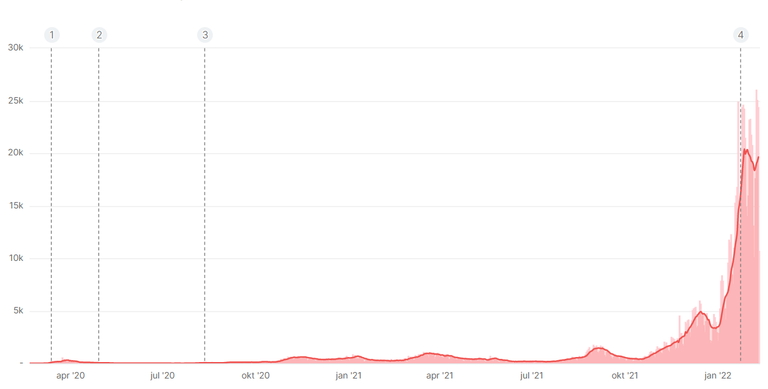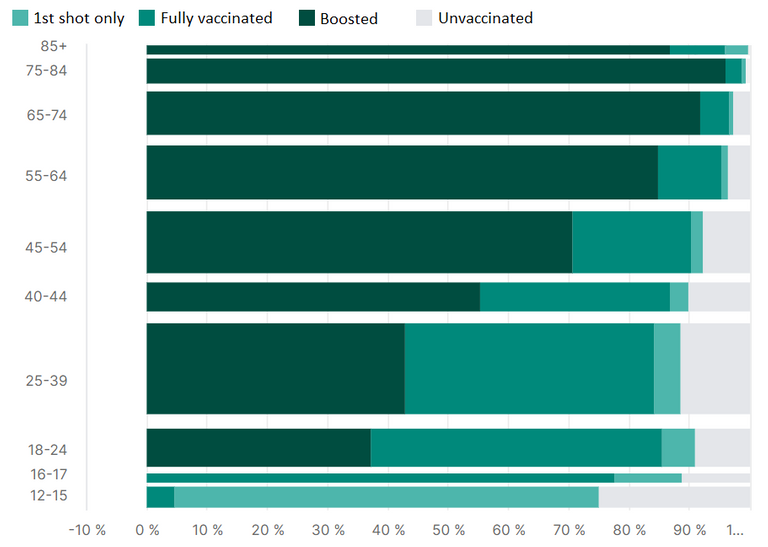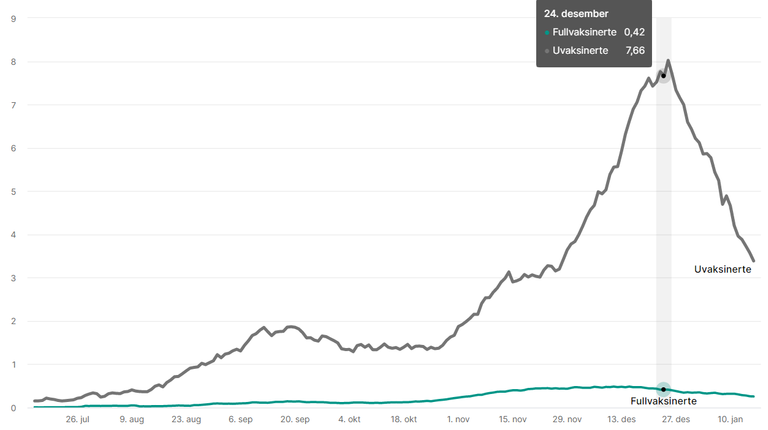It’s only been 11 days since Denmark removed all remaining covid-restrictions, becoming the first country in Europe to do so since Omicron was discovered. Likewise, Sweden lifted all its restrictions at the beginning of this week.
While Norway, who loosened up a fair bit at the time, some restrictions remained like a mandate for wearing a mask when keeping a 1-meter distance was not feasible as well as quarantine when testing positive. All of that will now be gone, meaning that Covid will no longer be treated as a dangerous infectious disease.

Photo by Paal Audestad / Aftenposten
It must be said that Norway has hardly ever had any harsh mandates or lockdowns the ways we've seen in much of the western world. No vaccine passports, no vaccine mandates, no businesses or restaurants requiring vaccines or tests in order for people to attend. Yet, the vaccination rates have been much higher than in any of the countries that imposed it these ways.
20x the cases, but less than a third in intensive hospital care.
Many other European countries are keeping their strict mandates despite Covid cases going down. It is therefore interesting to see that Norway is now removing all restrictions despite the Covid cases being literally at its peak and about 20x the height of the peaks in any of the previous waves. The reason is simply that Omicron does not cause nearly as severe symptoms as Delta.
On this basis, the public health institute has earlier suggested declassifying Covid as a "deadly disease", and also stated that with the current state of Omicron, restrictions have more of a negative impact on public health than positive all things considered.

Judging by the cases alone, one may be surprised to hear that the public health institute would recommend fully reopening now. However, despite the surge in cases taking the daily figure to 26,000 (compared to peaks of around 1000 per day in previous waves), the number of people in intensive care at the hospitals is just 41 (compared to 125 during the Delta wave in fall last year and 117 during the first surge in April 2021). In other words, only one-third the amount.
This also shows that previous variants were really bad
While it is great news that Omicron is way less deadly and severe, the flip side is that this is further proof that previous variants were. If Omicron cases are up 20x, yet intensive hospitalization is down more than 66%, that also means that Delta, despite having only 1/20th the cases, still resulted in more than three times more people needing intensive care. So if you’re someone who has had Omicron and as a result had a fairly normal flu experience, then you can tell how much worse Delta and previous variants must have been.
And although this does not mean that past vaccine mandates and lockdowns were right, it does mean that we were right to treat it with utmost care. I find it sad how politized this whole pandemic has become. How it seems as if one is either against all efforts to mitigate disease or in favor of governments imposing any means necessary to reduce cases as if it was the only factor relevant to human well-being.
Vaccines crucial in keeping death rates low
Looking at Norway, Denmark, and Sweden, it is clear that the high vaccination rates among the elderly (more than 99,5% of the people older than 75 years in Norway) have been crucial in keeping hospitalization and deaths down.

So far, the United States with its 914,000 Covid-related deaths has had 10 times more deaths per capita than Norway with its 1500. This is despite the figures in Norway including anyone who has died whilst having covid, regardless of whether it was the primary cause of death.
So either there is no difference due to differences in measurements, or the numbers are even worse comparably for the US. However, there is some good news from Norway, namely that Omicron is also shown to be less dangerous to those who are unvaccinated.
Omicron also less dangerous to the unvaccinated
With the Delta wave having been more of a "pandemic of the unvaccinated", where the unvaccinated were almost 20 times as likely to need intensive hospital care when infected with Covid, we see a steady decline with the Omicron wave. Still, the difference is significant, with fully vaccinated people still being 13 times less likely to need intensive hospital care than their unvaccinated counterparts.

Conclusion
It's been about the time that all of society gets to return to normal. Although I've felt that the pandemic has been mostly over for my own sake since I recovered from long covid in April, the restrictions have still been a real issue for anyone in the hospitality and entertainment businesses. Hopefully, the trend we see with Omicron of Covid mutating to become less and less dangerous will continue, and thus spell the beginning of the end of this whole mess that has been allowed to cripple our lives for way too long. But this weekend, I'll be out partying. For now.